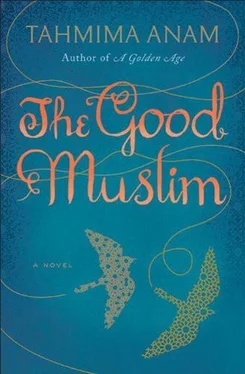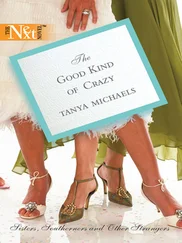‘When I found her, she looked as though she might slip away, at any moment.’
Before Maya could reply, Piya stepped back into the garden, holding a kerosene lamp in one hand, and a large bowl in another. ‘Jhal muri,’ she announced, placing the spicy puffed rice in front of them. As she scooped a handful into her mouth, Maya noticed a bracelet-shaped scar on Piya’s wrist. She looked closer at Piya’s arms: the other wrist was similarly marked. Piya set down the kerosene lamp, and suddenly Maya was filled with wonder that she should be here, among them, bearing the scars of her captivity, making snacks and sitting with them in the garden. What other wounds still marked her?
It was getting darker. They could barely see one another now; there was just a faint, oval-shaped pool of light cast by the kerosene lamp.
Piya and Sohail hatched a plan. Piya had never been to the cinema, and Sohail was trying to explain it to her. People on a wide, flat surface. Not real people — well, real, but not present. Acting — she knew acting, she had seen the jatra when it came to her village.
‘When it reopens,’ Sohail said, ‘we’ll take you. Won’t we, Maya?’
She nodded. ‘Did you know,’ she said, ‘Joy brought a film projector to our house during the war?’
‘From where?’
‘I don’t know. An abandoned theatre, I think.’
‘What is a projector?’
‘It’s the machine that shows the film.’
‘You have the machine?’
‘Do you want to see it?’ Joy had brought the projector for Ammoo. Now it was lying somewhere in the garden shed. ‘I think it’s still here.’
Sohail hesitated. She could tell he was thinking about whether it would cause him pain, or happiness, to see an object brought to this house by his friend.
‘Yes,’ said Piya, ‘I do, I want to see.’ She stood up and clapped her hands together.
‘All right,’ Sohail said, ‘let’s see it.’
The shed was a crude little building beside the lemon tree. Maya went inside first, holding the lamp high. They stepped over a few trunks and boxes, off-cuts of wood, a half-open bag of cement that had hardened over the years.
The projector was exactly where she had left it, wedged into a corner of the room, covered in dried banana leaves. ‘There it is.’
She remembered now, carrying it from the big house and tenderly placing the leaves on top, as though she were burying it.
Sohail heaved the box on to his shoulder and Maya helped him manoeuvre it into the house. They decided to set the box down in the corridor and examine it without turning on the lights. Maya held the lamp as Sohail unfastened the hinges.
All the pieces were there — the two round cases, one on top of the other, the protruding lens, the smaller pieces, the clips that held the film in place, the metal fasteners that opened and closed over the reel.
Piya reached forward, passing her hand delicately over the metal plates. Sohail pulled the projector out of the case and stood it upright on its sturdy metal legs.
‘This is where the film goes in, I suppose,’ he said, pointing. ‘It goes up here, and through this part, and the light catches it and makes it big, very big. The film itself is only the width of two fingers. It’s the light that makes it bigger.’
‘How big?’ Piya asked.
‘Bigger than a person,’ Sohail said.
Piya fixed her eyes on him.
‘Sometimes when they show just the face, you can see everything, you can see inside them,’ he continued.
‘You can see inside?’
Maya thought the girl might weep from the wonder of it.
‘Shall we see if it works?’ she said. ‘I think there are a few films in there.’
Piya lifted her hands from the machine and turned to face her. Her tiny eyes disappeared behind a pool of tears. ‘Yes, oh, yes.’
‘No,’ Sohail said, his voice suddenly distant. ‘We can’t do that.’
‘Why not?’ she asked, surprised by this change of heart.
‘It doesn’t belong to us, we have to give it back.’
‘But it’s here now.’ Maya couldn’t understand it. One minute he was gaping at the machine, the next he was acting as though the whole thing was done without his consent.
Sohail moved to replace the projector. ‘Let’s not do something we’ll regret.’
‘I won’t regret it,’ Maya said. ‘And neither will Piya. Will you, Piya?’
Piya had sensed the shift in Sohail too. She shuffled away from the projector and leaned against the verandah wall, squatting in the village way, with her elbows on her knees. ‘I don’t know.’
Maya pursued her and crouched down beside her. ‘Haven’t you ever done anything you might regret later?’
‘Maya, please, don’t be childish.’ Sohail was packing up the projector, tucking it back into its felt grooves. ‘Look, here’s the stamp. Modhumita Cinema. How many times have you and I gone to that cinema? And who knows how Joy got the thing here anyway.’
‘What are you saying, that your friend is a thief?’
‘I’m saying a lot of things happened during the war, but now it’s not wartime any more, and we have to behave like citizens, rather than rebels.’
‘I don’t think Piya cares about that,’ she said. ‘I think we should let her see a film. Isn’t that why we fought this war anyway, so we could be free?’
‘That’s a completely bogus argument, you know that. Freedom comes with responsibilities, with limits.’ He snapped the lid shut, as though there could be no further debate.
‘I have done something,’ Piya whispered from the darkness. The lamp was burning low, and didn’t reach her any more. Sohail lifted the projector box into his arms and was about to stand up. He paused.
‘What?’ he asked.
‘Something very bad.’
Sohail squatted down in front of Piya. He came very close to her, but he was careful not to touch her. She was shrinking from him anyway, pressing her back into the wall. ‘It doesn’t matter,’ he said. ‘Forget it. You should try to forget it.’
She grew silent, but they could hear her breathing, as though the words were struggling to get out of her and she was struggling to keep them in. Maya didn’t want Piya to forget what had happened to her, she wanted her to remember. She wanted her to remember and she wanted to know. But she did not press Piya. Everyone else was determined to forget, to move on and leave behind whatever dirty things had happened in the past; it would be cruel to deny Piya this, a chance to begin again.
‘It doesn’t matter,’ Sohail said. ‘Whatever it was, it wasn’t your fault.’
‘He’s right,’ Maya said. ‘Don’t blame yourself.’
Certainly they had only meant to comfort her. But Piya was different after that night. Something had rippled within her, demanded to get out, and they had silenced it.
A few weeks later, she was gone.
The queue snaked out of the tent, wrapped around the corner and doubled back on itself. In some places people had taken to crouching on the ground, holding their hands up against the fierce heat, quieting their babies. They shared stories and bits of food while they waited. Maya heard the call of the muezzin, and saw great swathes of pilgrims making their way to the prayer ground. But the people in the queue did not budge: they were here for the free medicine.
They had all the usual ailments — dysentery, dehydration, broken legs that hadn’t healed properly, wounds that should have been stitched up but never made it to hospital. Jaundice, malaria, typhoid. It had taken her the better part of that morning to organise the clinic. The other doctors — young interns and trainees who had probably never left their city hospitals — were relieved to be told what to do. She barked out orders, telling them to run down the line and divide the patients into groups. Put the young children first. Check for infectious diseases. Separate queues for men and women. By noon she was seeing a patient every seven minutes, and a pregnant girl with gest ational diabetes had hugged her and cried. She felt the murmur of a thrill. She was right to have come.
Читать дальше












